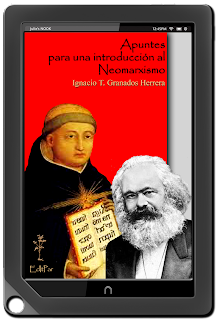Hegel
doesn’t deny the conception of God, he even tries to define it deriving from the difficulties
of empiricism; the problem here is the contradiction it doesn’t solves, as the
proper nature of His, since it’s not a being. In this logic, since Parmenides
the not being can’t be something, or it becomes a being, thus the problem with
this; unless it’s about not being a specific being, in that sense of its
universality —as it looks like—, in which it’s then a condition.
Not
being a being but a condition, explanation God emanating of us as from nature,
functioning as His Immanence; being then this reality itself —which is still a
being just not specific— with God as its own peak and excellence. This
conception of God has an apparent problem though, in its lack of proper immanence,
as identity different from us; which is normal for a Nature, and thus reduce God
to the typical mechanics of all rationalizations, like these of Aristotle and
Aquinas.
But
God have necessarily an identity, in the same concept of its divinity as
objective, or He doesn’t exist at all; which is the problem bordered by Hegel,
refusing to enter a dangerous political terrain of his convulse time. Here
comes the other problem of contextualization, explaining the intricacy of Hegel
outside its magnificence; as that context of his in the politics problematizes his
philosophy, which is also his profession and thus his way of life.
This
is the problem with Hegel's thought, as it’s impossible to decontextualize it
in danger of breaking its own logic; of course, when decontextualized it
becomes absolute in value, but only as self-referent. This doesn’t make sense
though, since Hegel doesn’t exist by itself but as the peak of Transcendental
Idealism; and this is not an organized doctrine but a hermeneutical spectrum,
formed as a more or lest chaotic mass of critical contradictions; also more or
less systematized —more than less— by Hegel, but not as definitely as to solve
all those contradictions.

That’s
why the problem of authority’s fallacy is so recurrent in Hegelianism, functioning
as its own reference; while it doesn’t stand its proper contextualization
either, due the extra philosophical (political) pressures it eludes. In itself,
at the moment of Hegel, Transcendental Idealism is already a dialectical loop;
that refusing to digress in its multiple contradictions from politics, becomes increasingly
intricate, turning around itself.
It
may come as density because its intricacies, but then lacks the consistency of
the reality it struggles to understand; and this is the problem of that
conception of God, with its nature as primary transcendent and only then
immanent. The problem here is that transcendence is a condition of immanence,
not the other way around; since immanence is the condition of the being as
being itself, even if determined by what’s not said being.
Let’s
intricate, cabalistic Neoplatonism —in the same basis of Transcendental
Idealism— solves this problem; contracting the absolute immanence of God on its
will of Transcendence, to make place for this Transcendence; which then becomes
of relative immanence —as a result of this contradiction— in its Son. Here God’s
absolute transcendence becomes from its absolute immanence, to become that new transcendence;
like in the Second Person of Trinity, which is that relative immanence, but
turning to that absolute Transcendence of His First Person.
Of
course, this is Cabalism applied to Christianity as an understanding of reality,
in Christ as the Son of God; but it’s a solution given by Cabala itself —as a
recurrence
—,
with the category of Kether as that of the Son; resulting from that contraction
in Titsum; which would become the God’s relationship with itself as reality
(Kether), on its own determination (Ain-Soft). This turns Transcendental Idealism
a corruption of its own hermeneutical base in Platonism, affecting its
consistency; while showing the near Plato birth of Realism —with Aristotle— its
needed adequation, in a better understanding of reality; still idealistic as a
mere comprehension of reality —in a representation— and not reality itself, but
without the distortions of dialectics.

.jpg)
















